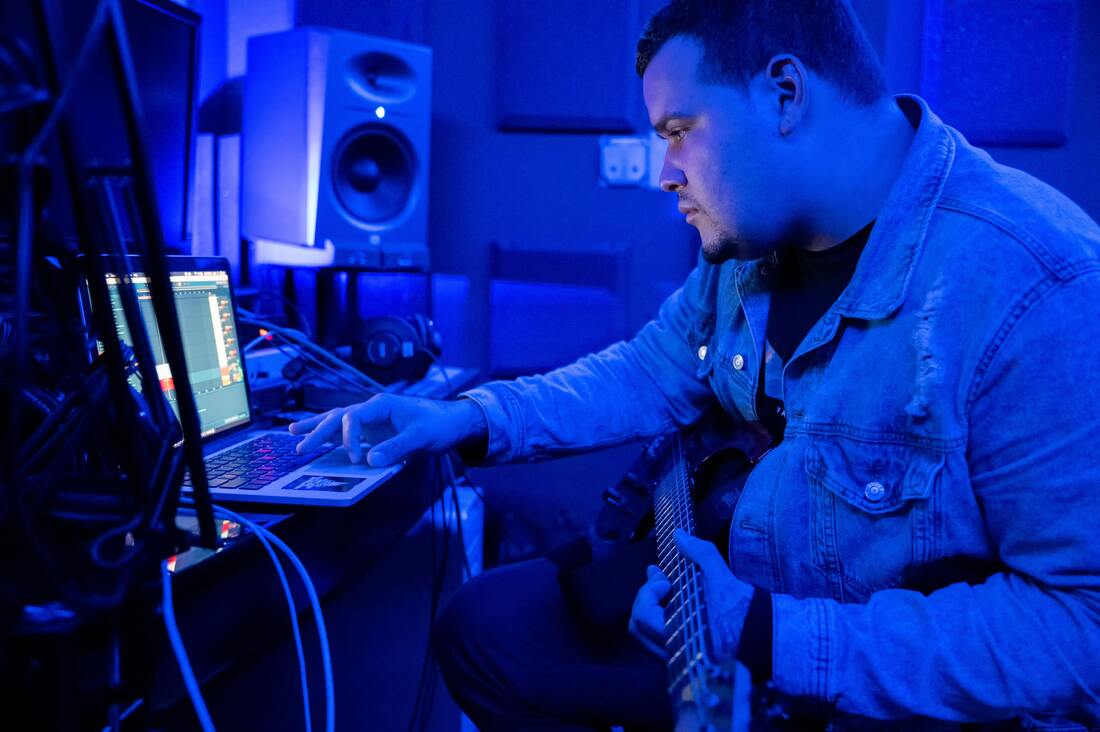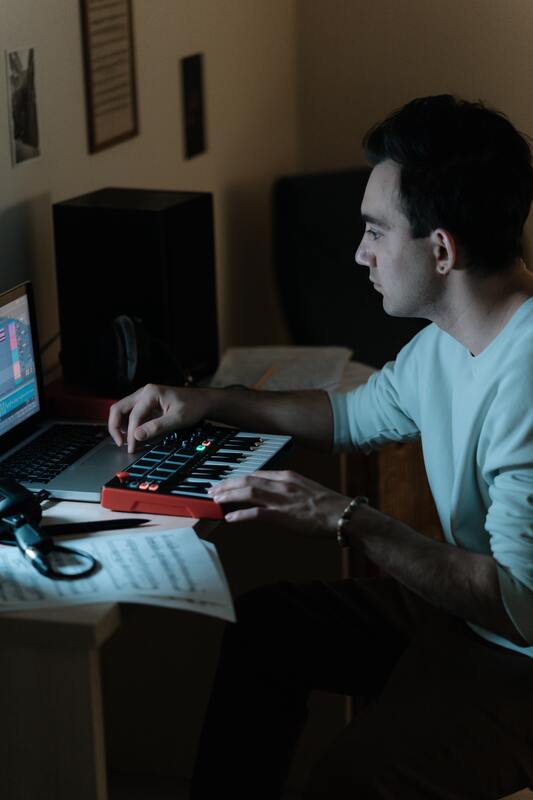 In my last blog post - "DIY Music Recording and Production: It Doesn't Have to Be All or Nothing!" - I offered some tips on how to decide what parts of the music production process you can/should handle yourself and for what parts you should look to a specialist for help. Those parts included tracking, editing, mixing and mastering. The advice was all based on a self-assessment and whether you felt your skills were up to snuff on those parts. But, sometimes it can be hard to do a truly objective self-assessment. For example, for mixing, I wrote that you need skills such as EQ'ing instruments and voices, smoothing out musical passages using compression, and knowing how to use automation properly, among other things. But, how do you know if you're actually good enough at those things? Well, here's an approach you can take. Let's say that you're planning on releasing a 10-song album. You recently got a DAW like Pro Tools and have learned how to navigate around it. You are considering handling all of the production yourself. You record a song. You mix it. It sounds good to your ears. Maybe even better than you thought it would sound. But, major label artists pay hundreds of thousands of dollars to record, mix and master their music. It can't be this easy, right? Is there something that could be better about the sound of your album if you paid professionals to work on it? Well, there's one way to find out. Consider taking that song you've recorded and mixed yourself. See if you can find a recording and/or mastering studio to mix it and/or master it. You'll pay their rate. But, it will only be for one song, so it's not like you'll be paying a fortune or committing to having your entire album done. And the results will tell you a valuable story. You will likely arrive at one of the following conclusions:
Regardless of the outcome of this experiment, if you're truly interested in ensuring that you have a respectable recording of your music available to release, having one song mixed and/or mastered as a "test" is usually money well-spent. Before and After Music Group is happy to do one-off mixes and mastering, whether or not there is a potential for more songs to be mixed/mastered. Our rates are some of the most affordable, helping you not to invest too much in something that could end up being a "test." Of course, we think our work could end up being so impressive you have all of your music mixed and/or mastered by us! So, feel free to contact us to discuss the ideas you have for your music recording project. We'd be happy to share our thoughts on how you can get the most out of your DIY approach, while bringing in a professional where necessary to enhance it. You can reach us at beforeandaftermusicgroup@gmail.com or 412-600-8241.
0 Comments
 When average musicians think about music recording and production, they think of two approaches: the professional approach and the do-it-yourself (DIY) approach. The professional approach involves going into a well-equipped recording studio with an experienced, professional engineer for tracking, overdubbing, editing and mixing, then shipping off your mixes to an experienced, professional mastering studio for mastering. The DIY approach is where the artist does everything themselves using consumer-level hardware and software. The DIY approach is usually chosen to save money. The results are often - but not necessarily always - less impressive with the DIY approach. Today, I'm here to tell you that a hybrid approach is a valid third approach. It allows you to save money while not sacrificing too much quality. The key to getting the right balance of the DIY and professional approaches is to honestly evaluate what skills and resources are needed and what you have available to you, then choosing what you do yourself and what you leave to the professionals. Let's break down "music production" into a few of its phases and talk about the skills and resources needed for each phase. Tracking & Overdubbing Tracking and overdubbing are phases that require the least technical skill. And except for recording drums, they are phases that require fewer technical resources. For everything except drums, you will need the following skills and resources:
For recording drums, you will need microphones for each drum as well as overheads. Generally, you can get away with basic instrument microphones and stands/clips for each drum except the kick drum, which will require a kick drum-specific microphone. Overhead microphones are usually condenser microphones designed for that particular purpose. And, you need a room acoustically appropriate for drum recording. Some people choose to take a different approach with drums, either programming them using a software program or tracking them as MIDI. Some artists do all of their tracking and overdubbing themselves. Others do none of the tracking and overdubbing themselves. And it's not uncommon for artists to record their drums in a professional studio and do the balance of tracking and overdubbing in a DIY fashion. Editing Some aspects of editing, like making timing corrections, can be done within the bones of the DAW. Others, like vocal tuning, require third-party plug-ins. And, if you want a recording that is competitive with what comes out of pro studios - some may, some may not - you will need to do vocal tuning. So, in addition to what you needed for Tracking & Overdubbing, you will also need:
If you are taking a hybrid approach to music production, you can choose to editing yourself or send your recording to a professional for editing. I will say this...if the vocals require a little more TLC than just a nudge of a note here or there, having vocal editing done by an experienced professional will result in the vocals sounding a lot more natural. Mixing Mixing is where specialized skill and experience really separates professionalism from amateurism. Someone's first mix ever will not sound anywhere close to a mix done by an experienced professional. That's because a common misconception is that mixing is just balancing the volume of instruments and voices. It's much more than that. While mixing can be done within a DAW using built-in capabilities, here are the additional skills needed for a good mix:
If you've never mixed a recording before and want to publicly release a recording that is taken seriously yet still allows you to take advantage of the cost savings that a DIY approach offers, mixing is a smart place to start getting professionals involved. Mastering Even when a record label-caliber recording is done in a professional recording studio, it is usually sent to an independent mastering specialist for mastering services. The prevailing logic is two-fold: someone who specializes in mastering will be much better at it than someone who does recording but dabbles in mastering, and having a separate mastering specialist means that you will have two music industry professionals putting their talent to work to make your recording sound its absolute best. So, naturally, even if you've done tracking, overdubbing, editing and mixing yourself, it's to your benefit to have a professional do your mastering. In fact, I'd say that if you only have one process performed by someone else, it should be mastering. It's the last chance you have to make a sonic improvement to your music before it goes to streaming or physical product manufacturing. And, it's usually less expensive than vocal editing or mixing. You'll give yourself the opportunity to at least have one music industry professional contribute to the quality of your recording. If you want to do mastering yourself, you should know that DAW's are generally not designed to do mastering. There are some people who try to do mastering within a DAW with its built-in plug-ins. But, that's not really true mastering. Here are the additional skills and resources you need to do mastering:
Closing Thoughts Obviously, if money were no object, every musical artist would have the best producers, recording engineers, mixing engineers and mastering engineers work on their recordings. But, money is an object. So, some situations require a DIY approach to enable artists to get their music out there on a limited budget. Therefore, it's good to think through what you can accomplish yourself and, if you do have some budget available, where you might be able to afford a music industry professional to enhance your work. Before and After Music Group is a company that specializes in mastering. If you would like to have at least one outside company take your DIY project to the next level, we'd love to hear from you and discuss what we can do for your music. Contact us at beforeandaftermusicgroup@gmail.com or 412-600-8241!  The COVID-19 pandemic and its associated lockdowns that began in 2020 brought about several shifts in the music industry. One of those was referred to as a "home recording boom" by the Economist. Unable to play live and, in many cases, unwilling to get together with other musicians or recording specialists, musical artists began exploring recording at home in unprecedented numbers. This movement was largely forced on us by the public health crisis. But, it was facilitated largely by decades-long trends in the recording industry that saw recording software become more powerful, more compatible and more affordable than ever. That doesn't mean that every musician who recorded at home produced great sounding tracks that rivaled the quality of the biggest and best studios with the most experienced engineers. In reality, it's probably safe to say that most of the recordings produced by first-timers were pretty bad. But, it's probably not a stretch to say that some musicians learned quickly and, with an innate knack for it, were able to produce some music that sounded good when reduced to a recording. Pre-COVID-19, musical artists usually engaged two audio professionals to get their music into radio-ready shape: a recording engineer and a mastering engineer. So, does the trend towards home recording make these two professionals endangered species? Not exactly. You see, there are several very specialized processes that happen between writing a song and having it prepared for radio airplay, streaming and/or CD production. As I wrote in a previous post entitled "9 Steps for Releasing Your Music," those include tracking, overdubbing, editing, mixing and mastering. Each involves its own skill set. So, you could start from the beginning and hand your project over to a professional once you no longer have the skill set required to produce the quality you want at the step that you get to. But, let's just say that you want to do as much as possible yourself. Maybe you want to spend as little money as you can. Should you have a home recording mastered? Before I answer, let me make sure we are on the same page in defining a "home recording." By "home recording," I do not mean a live, one-take recording of a full band on an iPhone. I am talking about a multi-track recording done on a Digital Audio Workstation (DAW) such as Pro Tools, Cubase, Logic or, hell, even Audacity. I would say that you should probably not bother getting an iPhone recording mastered. It's unlikely that any mastering services will be able to whip a phone recording into radio-ready shape. However, if we're talking a multi-track recording on a legit DAW, I would absolutely recommend having mastering done by an experienced specialist. Here's why... Most songs you hear on the radio will have had at least two top-level professionals involved in the production of them: that recording engineer and mastering engineer. If you've recorded your own music - and assuming that you haven't been in the business of recording other people's music daily over a period of years - you've already cut one of those professionals out of your recording. Your recording is already unlikely to sound as good as it would have if you had gone to a pro studio. But, sending the tracks you've recorded out to a professional mastering studio allows you to at least have one of those professionals involved in getting your music in the ballpark of its sonic potential. And professionally-done mastering can sometimes have a bigger impact on a mediocre recording than it can on a phenomenal recording. A phenomenal recording may already have its instruments so perfectly EQ'd and compressed that the mix sounds tonally balanced and dynamically smooth. Mastering can certainly improve upon that. But, if a mix has some notable deficiencies compared to major label releases, mastering can close those bigger gaps to a greater extent. I get it, recording at home can save a lot of money. When I've recorded in other professionals' studios, I've paid around $450ish per song for the tracking/overdubbing/editing/mixing aspects. And I've paid $50-$150 per song for mastering. So, if you choose just to have professional mastering done, it's a smaller proportion of the overall expenses that you are choosing to pay. If you are considering having your home recording mastered, please keep Before and After Music Group in mind. We would love to help your music reach its sonic potential. Contact us at beforeandaftermusicgroup@gmail.com or +1-412-600-8241 and let's discuss your project! |
AuthorChip Dominick is the CEO and head mastering engineer for Before and After Music Group Archives
June 2023
Categories
All
|

 RSS Feed
RSS Feed